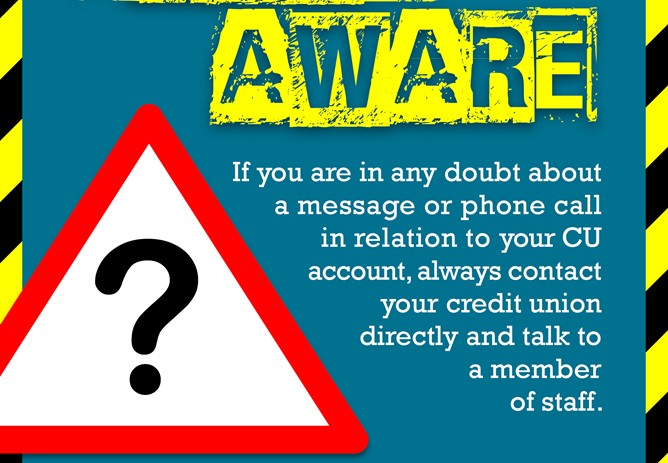31 October 2024
Fraud Awareness FAQ
Are credit union members being impacted by a phishing scam?
• In recent weeks, we have been made aware of a phishing scam impacting credit union
members. We are reminding all members and the general public to remain vigilant when it
comes to the security of their financial information.
• This kind of scamming is becoming more prevalent, with members of the public receiving
similar bogus communications from many different fraudulent sources. For example, text
messages or emails supposedly from road toll companies, banks, delivery companies and
even online shopping outlets.
What does the scam entail?
• We are aware of members receiving fraudulent text messages and/or phone calls from
people perpetrating to be the credit union, asking for the member to verify their account.
• Your credit union will NEVER contact you by phone or text, or by any other means
requesting your account information.
What should someone do if they receive a suspicious text or phone call?
• Firstly, never ever give out your personal information to anyone over the phone or via text.
Never click on a link that you are not sure of, and be wary of all communications
perpetrating to be from a financial institution.
How will a member know if the communication they receive is fraudulent?
• It is becoming increasingly difficult to identify fraud, but if something doesn’t feel right, it
probably isn’t. In most instances, these will be unsolicited contact or messages.
• Fraudsters are becoming more and more sophisticated in their operations, creating very
convincing email templates and even fake websites that lure people into a false sense of
security.
• They can also make it look like a call or text is coming from a number familiar to you, such as
that of your local credit union. Again, your credit union will never contact you out of the blue
asking you to confirm or share personal information.
Who is most at risk?
• Anyone can be a target for fraud, which is why everyone should always carefully review any
communication they receive that appears to be from their credit union or any other financial
institution.
• Unfortunately, those who have been victim to a scam before are more likely to be targeted
again.
• Never share your password, account number or any personal details, even if the person on
the phone has some basic information on you such as your name or location – often this can
be found easily through an online search.
What should a member do if they receive a suspicious communication?
• Do not click any links and delete the message immediately.
• If you receive a phone call, hang up and do not call the number back.
• If you are in any doubt, contact your credit union immediately and speak to a member of
staff.
What should a member do if they have already given their information?
• We would remind people to never give their information to anyone. If you do fall victim to a
scam, you should immediately alert your credit union and the Gardai. Your credit union may
be able to take appropriate action such as freezing your account or cancelling pending
payments, where possible.
If a member has their money taken, can it be recouped?
• Each incident is being reviewed on a case-by-case basis. It's vital that anyone impacted
contacts their financial institution as soon as they can.
• In general, if a person hands over their full log in or password details, they may not have any
recourse. However, each case can be different, and we strongly encourage anyone impacted
to talk directly to their credit union as quickly as possible



